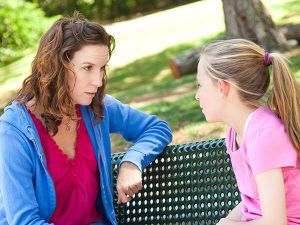Difference between revisions of "About-cancer/coping/adjusting-to-cancer/talk-to-children/zh"
(Created page with "*当他们被要求安静或在房子周围做更多的家务时,会感到生气") |
(Created page with "*错过了他们习惯获得的关注") |
||
| Line 50: | Line 50: | ||
*当他们被要求安静或在房子周围做更多的家务时,会感到生气 | *当他们被要求安静或在房子周围做更多的家务时,会感到生气 | ||
| − | * | + | *错过了他们习惯获得的关注 |
*Regress and behave as they did when they were much younger | *Regress and behave as they did when they were much younger | ||
Revision as of 21:11, 31 October 2019
与孩子谈论您的癌症
即使您的孩子在得知您的癌症时会感到沮丧,也不要假装一切都好。 甚至很小的孩子也可以感觉到什么时候出了问题。 他们会看到您感觉不舒服,经常离开家,或者不能像以前那样花很多时间陪伴他们。 年仅18个月的儿童开始注意到周围发生的事情。 诚实很重要。 说实话比让他们想象最坏的情况要好。 给您的孩子一些时间来提问和表达他们的感受。
所有年龄段的孩子都需要知道什么
关于巨蟹座
- 您的孩子没有做过,没有想到或没有说过致癌的事情。
- 仅因为您患有癌症并不意味着您会死于癌症。 实际上,许多人患癌症的时间很长。
- 您的孩子不能使您康复。 但是他或她有一些方法可以使您感觉更好。
- 科学家正在发现许多治疗癌症的新方法。
关于家庭癌症患者
- 您的孩子并不孤单。 其他孩子的父母患有癌症。
- 生气,生气或害怕都可以。
- 您的孩子无法采取任何措施来改变您患有癌症的事实。
- 家庭成员可能会因为担心您而采取不同的行动。
- 无论您发生什么事情,您都将确保您的孩子得到照顾。
关于他们可以做什么
- 他们可以通过做一些不错的事情来帮助您,例如洗碗,打扫房间甚至为您画画。
- 他们仍应上学并参加体育运动和其他有趣的活动。
- 他们可以与其他成年人交谈,例如老师,家庭成员以及宗教或精神领袖。
患癌症时孩子如何行事
儿童可以多种方式对癌症做出反应。 例如,他们可能:
- 感到困惑,害怕,孤独或不知所措
- 感到内,并认为他们的所作所为或引起您的癌症
- 当他们被要求安静或在房子周围做更多的家务时,会感到生气
- 错过了他们习惯获得的关注
- Regress and behave as they did when they were much younger
- Get into trouble at school or at home
- Be clingy and afraid to leave the house
- Learn what can help children and teens who have a family member with cancer.
Teens
If you have a teenager, know that they're at a time in their lives when they're trying to break away and be independent from their parents. Try to get them to talk about their feelings and ask questions. Tell them as much as they want to know about your cancer. Ask them for their opinions and, if possible, let them help you make decisions.
Teens may want to talk with other people in their lives. Friends can be a great source of support for them, especially those who also have a serious illness in their family. Other family members, teachers, coaches, and spiritual leaders can also help. Encourage your teenage children to talk about their fears and feelings with people they trust.
For more information about support for teens, you may find it helpful to share this e-book When Your Parent Has Cancer: A Guide for Teens with them.
Adult Children
If you have adult children, your relationship with them may change now that you have cancer. You may:
- Ask them to help with making health care decisions, paying bills, or taking care of the house
- Ask them to explain medical information
- Need them to go to the doctor with you or pick up medicines
- Rely on them for emotional support
- Feel awkward when they help with your physical care
For some parents, it may be hard to ask for comfort and care from their grown children. But it's important to talk about cancer with your family members, even if they get upset or worry about you. Try to include them when talking about your treatment. Let them know the choices you would like them to make about your care, in case you're too sick to make the choices yourself. (See Advance Directives.) Recognize that it may be hard for your children to have this talk and that, like you, they're trying to adjust to your illness.
For more details and age-related tips on talking to kids, your family and friends may find it helpful to read the NCI booklet, When Someone You Love Is Being Treated for Cancer.
